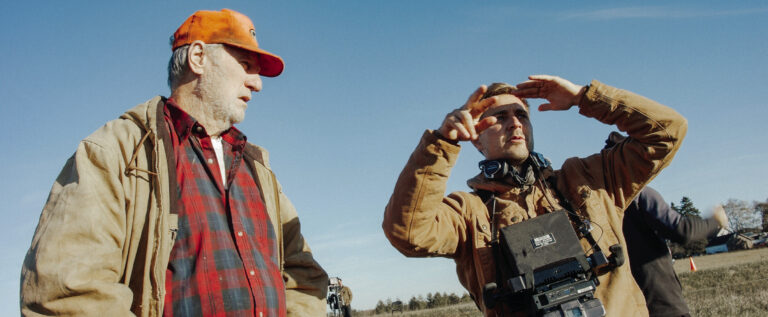When veteran actor Craig T. Nelson signed on to play Buck in “Green and Gold,” he wasn’t just stepping into another role — he was stepping into a story that echoed his own roots, values and life experience.
The independent feature, shot in rural Wisconsin and created by Upper Peninsula natives Anders and Davin Lindwall, became a deeply personal project for the Emmy-winning actor.
“This one felt close,” Nelson said. “You start to realize the legacy your ancestors gave you — the values they instilled, the work ethic they lived by. Farming is a hard life. It takes resiliency, and I think the film really brought that out.”
Nelson, known for iconic roles in “Coach,” “Parenthood” and “Poltergeist,” related immediately to Buck, a weathered grandfather trying to hold together his family and farm after the death of his daughter.
As a father, grandfather and great-grandfather himself, Nelson found the emotional core of the character familiar.
“When you’re the patriarch, there’s responsibility and accountability that comes with that,” he said. “The challenge is in trying to connect across generations — especially when you’ve lived through loss. Buck carries the guilt of losing a daughter, and it’s created a barrier between him and the people he loves.”
That tension came to a head in one of the film’s most poignant scenes, a quiet moment in a barn between Buck and his granddaughter Jenny, played by Madison Lawlor. Originally written by director Anders Lindwall, the scene was reworked by Nelson just days before it was scheduled to shoot.
“I read the original scene and felt like there was something deeper there,” Nelson said. “I started playing around with it, and the words came. I called Anders and said, ‘Let me read this to you.’ He could have shut it down, but he listened. He said it worked. So we tried it. And it did.”
Lindwall later said that the rewritten scene added an authenticity that hadn’t yet been captured. Nelson’s revision didn’t just give Buck a voice — it revealed the character’s heart.
“There’s a moment earlier in the film where Buck tries to pray in a field,” Nelson said. “And I told Anders, ‘I don’t think he knows how to pray.’ The words don’t come. He’s stuck. That’s who this man is. He’s not used to talking about his feelings, even to God.”
Nelson’s understanding of that quiet emotional terrain helped define Buck as a man who deeply loves but struggles to connect. It also defined Nelson’s investment in the project, a commitment that extended far beyond the script.
On Day 2 of production, Nelson approached the director with a practical question: “Where’s your other camera?”
When Anders told him they had only one, Nelson didn’t hesitate.
“Take what you need,” he told the crew. “Get a second camera. Have your producers talk to my people, and we’ll figure it out.”
Nelson personally funded the rental of a second unit camera, giving the indie team a wider range of coverage they couldn’t otherwise afford.
“You have too much to do, and you want to be able to have options,” Nelson said. “If you only have one camera, you’re stuck. Especially with a story where the environment is a character. The land — the farm — it’s the stage. You need the scope to tell the story properly.”
Nelson also praised the visual storytelling led by cinematographer Russ Fraser and the film’s subtle, moving score composed by Corey Martin.
“I didn’t even realize I was listening to music until halfway through the film,” Nelson said. “That’s how good it was — it crept in and pulled you in emotionally. That’s one of the beauties of this little movie.”
But perhaps one of the most meaningful aspects of “Green and Gold” for Nelson was sharing the screen one last time with longtime friend and fellow actor M. Emmet Walsh, who died shortly after production wrapped.
“I’ve known Emmet for years,” Nelson said. “We worked together on ‘Silkwood.’ He was a curmudgeon in the best way — smart, outspoken and just couldn’t help himself.”
During the shoot, Walsh confided in Nelson that he could no longer remember his lines.
“It broke my heart,” Nelson said. “That was his craft. He loved it. But it didn’t matter. We made it work. He was still perfect for the part.”
Reflecting on his own path — from aspiring metalworker to Hollywood mainstay — Nelson sees his life in chapters defined by integrity, faith and mentorship.
He joked during the interview that had acting not worked out, he might have become a tool and die maker — the same profession as the father of this reporter.
“I wasn’t good at it, but I loved metal shop,” he said. “And I see now how brilliant those trades really are. That kind of craftsmanship, that legacy — it’s powerful.”
Legacy, in fact, is what Nelson hopes audiences take from “Green and Gold.”
“I hope it reminds people of the connections we all have — to each other, to the land, to something greater than ourselves,” he said. “If we can drop the masks we wear and really listen, maybe we can hear what matters.”
For Nelson, stepping into Buck’s boots was never just about playing a part. It was about honoring a life — and a way of life — that still matters. In his quiet way, he brought depth, dignity and humanity to a small film with a big heart.
“That’s what ‘Green and Gold’ is,” he said. “It’s about love — for the land, for each other and for the things worth holding onto.”
